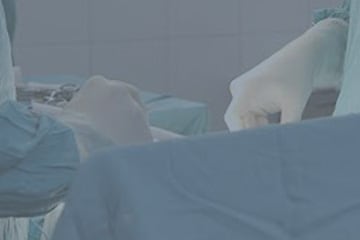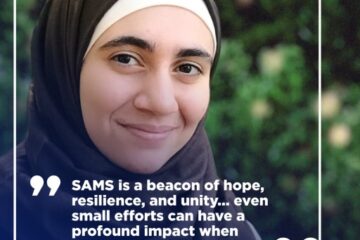August 31, 2017
I made my decision to leave specialist training in emergency medicine last year. My reasons for leaving were multi-factorial but for the most part I lost my confidence as a doctor.
When so much of my life was dedicated to medicine, I essentially felt like I lost myself. So I resigned with a blank slate and without direction – for the most part.
Since qualifying and interacting with groups of people through all walks of life and I noticed myself gravitating towards the most vulnerable patient groups. And so, I explored various means of living up to this ‘moral conscious’ of mine through volunteering opportunities both locally and internationally.
I took on locum shifts to help support myself financially when I heard about an organisation called the Syrian American Medical Society (SAMS). The Syrian refugee crisis being the largest humanitarian crisis in present time, I couldn’t ignore the responsibility to get involved. I chose to apply to the Northern Greece mission: it was by far the best decision and most enlightening experience in my lifetime so far.
Koutsochero: The First Days in Greece
I arrived in Thessaloniki on a Saturday. The travel there was uneventful and coming from the UK, Greece was quite familiar. I settled into the shared accommodation provided for all SAMS volunteers had my induction the next day and started my first day of work as a medical provider on Monday.
There were two refugee camps that generalist doctors were based at, one larger with over 1,000 residents in Koutsochero and the other one smaller with about 100 residents in Volos. Arriving at the camp on Monday there were already 20 patients waiting outside. Another GP and I each had one consultation room with allocated Arabic translators (some were refugees themselves).
Surprisingly it was easier than I thought to grasp the logistics of seeing patients, diagnosing, medicating +/- referring to hospital for admission/investigation/specialist follow up (with a lot of help from the volunteer nurses who already knew the system well!). The care felt familiar; most of the presentations in the camps were the same common presentations seen in the emergency departments (ED) back in the UK. I eased into the first day reasonably easily. Between two doctors we saw a total of 50 patients in 6 hours. Although it was new and overwhelming, it seemed like it was nothing I hadn’t managed with back home. I finished the day with some peace of mind that I was coping well and satisfied that I had met some new wonderfully inspiring people to work with.
Volos: A Family’s Trauma
After spending that first night getting to know my new SAMS colleagues, the next day came around. This time the GP and I spent the day at Volos, the smaller camp.
My second day felt longer despite only seeing 20 patients in 7 hours. The presentations here were of a completely different calibre. There were more mental health complaints as most of the residents have been in the camp for a longer duration of time and were therefore dealing with chronic medical complaints, administrative complaints (hospital referrals etc) and legal complaints (relocation requests). I had expected the high incidence of mental health issues given that all the residents would have some aspect of post-traumatic stress disorder (PTSD), depression, psychosis, separation anxiety etc. But I was not prepared to listen, face to face with the stories that were being translated to me.
One case in particular was exceptionally difficult. A 16 year old boy couldn’t bear to face our medical team that his father came to us in tears instead pleading for a letter to the United Nations to re-locate them. He was unwilling to specify the details but spoke extensively of the trauma they experienced in Syria, losing his wife and that his son suffered a traumatic experience in a ‘public bathroom’.
Since arriving in Greece, his son has been unable to go to any public space alone. He suffers with frequent bed-wetting, paranoia, anxiety and emotional instability. He had only disclosed this information to the father and no other family member. They are struggling to cope in the current camp because of the living arrangements and public toilets. We agreed to make a protection order to request on mental health grounds urgent relocation. When the father left our clinic area, he walked over to his son sitting on a bench close by and his son collapsed into his arms in tears. I sat outside the clinic with our nurse leader subtly watching this young man cry into his father’s arms before they eventually walked off in each other’s arms.
We watched to make sure they were ok but it was difficult to not turn our eyes away from such a scene without breaking down ourselves. The clinic was due to close but I couldn’t help question how we walk away from what we just witnessed? How do we walk from these people with a meagre letter in hand for the UNHCR (United Nations High Commissioner for Refugees) knowing the uncertainty of approving an urgent relocation response? How many families are there out there with similar situations? How do we leave them with the simple statement that we will do what we can to help but this form is all we can do?
Suddenly, more questions, more emotions and more guilt flooded in. The human mind is awfully good at reflection. We are creatures of introspection, of unconditional empathy and of immense scepticism. These qualities alone are enough to drive anyone to insanity. Whatever these feelings were that I was having, this poor family was going through it 1000 x fold. How is there an expectation for these people to cope and progress to some sense of normality when we can’t even bare to listen to their stories? But what I will come to understand from my time here is that people are capable of an unlimited reserve of resilience.
Back to Koutsochero & Finding a Sense of Unity
The next two days are back to the first camp in Koutsochero. The days are busy and long. I start to get to know a few of the ‘frequent flyers’ as we say in ED back home. The families become more and more familiar and comfortable to talk to.
There seems to be a non verbal appreciation of the work being done in the SAMS clinic. There is a mutual understanding that sometimes as medical providers our role is just to listen – to listen to the stories, the concerns, the families left behind, and the hopes for future generations. We listen so they can feel empowered, so they can feel someone is paying attention even if it doesn’t change their situation. Sometimes the best care we can provide is to give patients their voice back.
The first week is over in a flash. It was difficult but manageable. So much had happened that I didn’t have time to process it all. Luckily, I was also surrounded by a wonderful group of volunteers to help distract from the long day’s tiring and emotionally draining work.. It is in experiences like this that help define ‘me’…as a doctor, as an educator, as a friend, as a family member and most importantly as a human being. No amount of qualifications, degrees and letters after my name can replace that.
I was astounded by the sheer dedication the volunteers had to each other and the patients. The willingness to constantly go above and beyond the call of duty was truly inspiring. Here, despite a multitude of nationalities, language barriers and professional backgrounds involved everyone worked with a sense of unity I had never witnessed before in my medical career.
Dr. Aqilah Vilcassim MBBS recently joined the Syrian American Medical Society for a medical mission to Greece, where SAMS is providing care in three camps of Northern/Central Greece.




